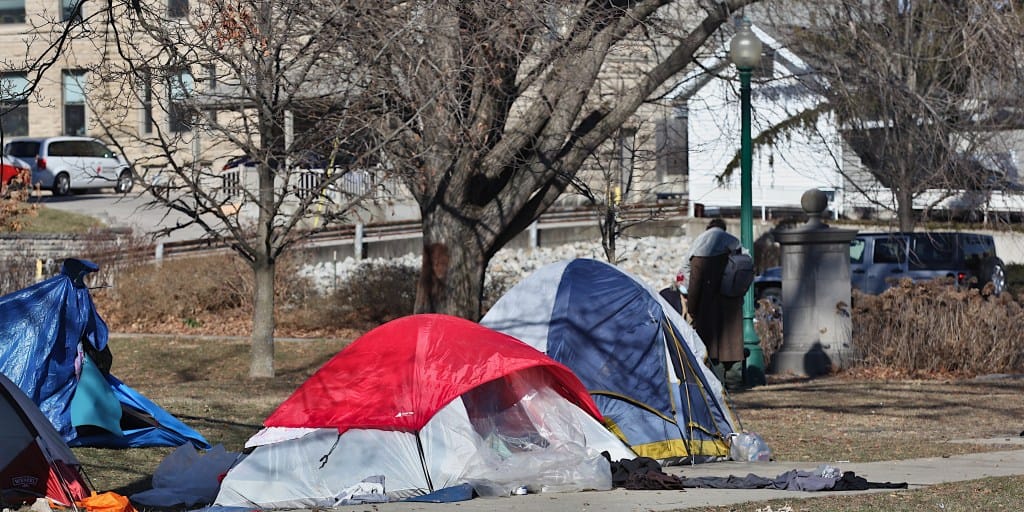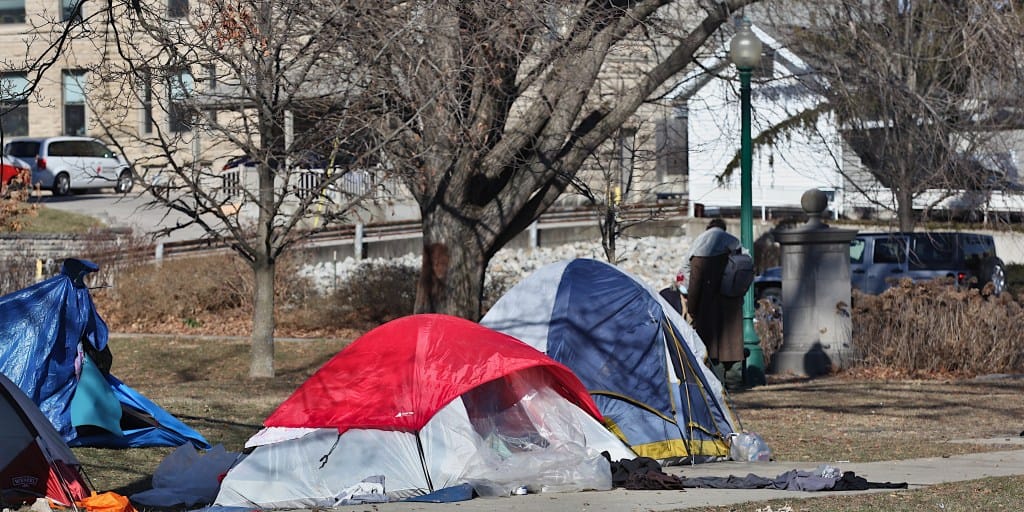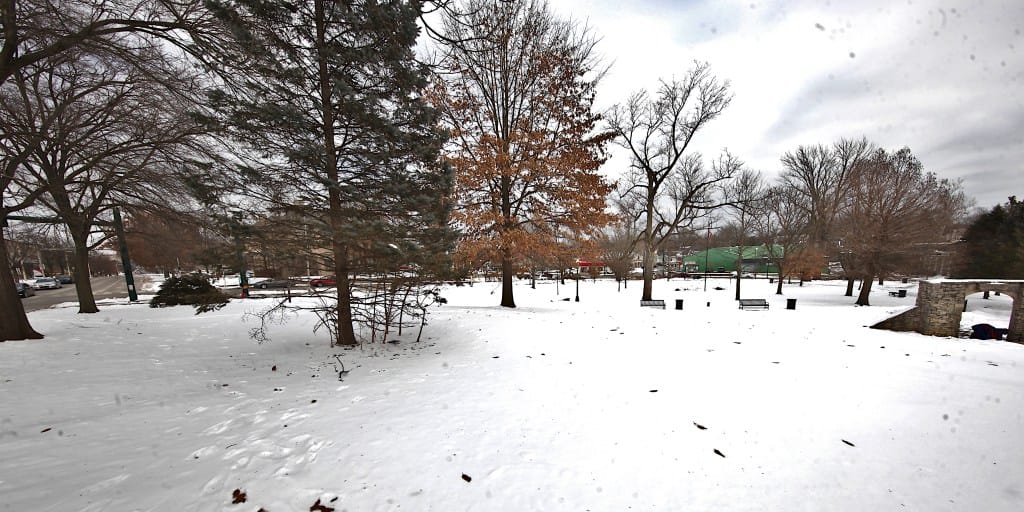Proposed Bloomington law to protect houseless encampments to get first reading on Feb. 17



A new local law that would provide certain protections to people living in city park encampments will get a first reading in front of Bloomington’s city council on Wednesday (Feb. 17).
That’s two weeks later than the Feb. 3 first-reading date that had initially been floated by sponsors of the ordinance—councilmembers Matt Flaherty, Kate Rosenbarger, and Isabel Piedmont-Smith.
The proposed new law comes after a decision by Bloomington’s mayor, John Hamilton, to clear a Seminary Park encampment in early December and again in mid-January.
On Sunday morning (Feb. 14), no tents were set up Seminary Park and no one was congregated there.
Highlights of the proposed new law include a requirement of 15-day notice by the city to a houseless person living in a city park encampment, before they and their belongings can be removed from the park.
The new law is being proposed in the context of a “Houseless Bill of Rights” that had been circulated by activist Vauhxx Booker just after the first clearance of Seminary Park in early December. One point of overlap between the proposed new ordinance and the “Houseless Bill of Rights” is the requirement of a 15-day notice before people are removed.
Another requirement of the proposed law is that the city catalog and store for at least 60 days the belongings of a person who is removed from a park encampment. The amount of belongings the city must store is described in the proposed ordinance as fitting “entirely within one 96-gallon container per displaced person.”
Under the proposed new law, the city wouldn’t be able to close down a park encampment unless there is “sufficient available housing”—except in the case of an emergency.
After giving the required 15-day notice, the city would, under the proposed new law, have to work with service providers, faith-based organizations, street ministries, or volunteers ensure that those in the encampment are offered alternative housing and wraparound services.
Bloomington’s ordinance is modeled on a 2016 Indianapolis ordinance.
A set of amendments to the Indianapolis law is currently being considered by the city-county council in the form of Proposal 76. On Feb. 9, the city-county council’s rules and public policy committee heard Proposal 76 and voted unanimously to forward it to the full city-county council for consideration.
An idea in Bloomington’s proposed ordinance that’s been added since earlier drafts were circulated, is the possibility that the city could designate a place where houseless people could camp overnight.
Bloomington’s proposed ordinance now describes a place in “an outdoor public park…or other public space as designated in section 030(h).”
The proposed ordinance included in the Bloomington city council’s meeting packet does not include a subsection (h) of Section 030. The mismatch is likely an artifact of an earlier draft version.
The designation of “other public space” is defined in Section 030(g) of the meeting packet’s version, which reads:
(g) The city may designate certain limited areas on public property where camps are allowed, and the requirements of BMC 2.87 shall apply only in those areas, provided that the designated areas are within one (1) mile of an organization that provides prepared meals at least five (5) days per week for people experiencing homelessness, allow adequate space for persons experiencing unsheltered homelessness, and include access to restrooms.
(Bloomington proposed Ord 21-06)
An earlier draft did include a subsection (h), which read:
(h) If the city or other public entity (including, but not limited to, the Bloomington Redevelopment Commission, the Bloomington Board of Parks Commissioners, members of the Monroe County Board of Trustees, or Monroe County government) grants permission for a camp to exist on land it owns within city limits, then the city must follow the requirements of BMC 2.87 if it seeks to close the camp.
(Not in Bloomington proposed Ord 21-06)
The idea that the city itself could designate an area where an encampment would be allowed is reflected in the proposed amendment to the Indianapolis ordinance, which includes a new section called “Safe Camping Sites.”
That amendment directs the Indianapolis office of public health and safety “to study the feasibility and cost of establishing one or more indoor or outdoor safe camping sites for the benefit of residents of Indianapolis experiencing homelessness.”
In connection with the possibility that Indianapolis would designate safe camping sites, city-county councilmember Ali Brown asked at last Tuesday’s committee meeting about the kind of responsibility that the city might be accepting, if it made such a designation.
Brown led off her question by stressing that it’s people, not things, who are the topic of the conversation: “We’re talking about human beings. So let’s be very kind when we use these generalizations that a lot of people are using.” She added, “People who are experiencing homelessness, a lot of times, systems have repeatedly failed them.”
Brown’s question was directed to Matt Giffin, who’s legal counsel at the office of public health and safety: “What is our responsibility when it comes to protecting the people there?”
Brown added, “Women who experience homelessness are often victims, not necessarily by other people experiencing homelessness, but they’re seen as victims in sex trafficking, sex crimes, things like that. What is our responsibility as a city to protect people when they’re in a camp that we have set up?”
Giffin’s answer was that a city-designated encampment would likely not work as a one-size-fits-all approach, say for victims of domestic violence. As far as the liability question, Giffin said, “The city will have some responsibility, if it’s on public property, but we will not be responsible for the acts of individual people.”
Included in Bloomington’s proposed ordinance is a provision that might address some of the frustration that was experienced by service providers and by residents of the Seminary Park encampment, about the timing of the city’s early January clearance of the park.
The city had announced a deadline of “on or about Jan. 11” and did not clear the park until two days after that. The proposed ordinance includes a requirement that two-days notice be given for any removal of people from an encampment, after the initial deadline expires.
(e) If a fifteen-day notice period, pursuant to subsection (a), elapses and the city does not displace the persons experiencing homelessness from the camp, then the city must give a minimum of 48 hours’ notice to the persons to be displaced, the Region 10 Continuum of Care Board and the Bloomington Common Council in the manner described in subsection (a) before proceeding with any displacement in subsequent days.
(Bloomington proposed Ord 21-06)
Part of the proposed amendment to the Indianapolis ordinance would add a clause about faith-based organizations clarifying when shelter space offered by such organizations qualifies as available shelter. The issue has received some communitywide comment in Bloomington, in connection with Wheeler Mission, which operates a shelter in Bloomington. From the proposed Indianapolis ordinance amendment.
Shelter space offered by a religiously affiliated organization may meet this definition, but only if the shelter space is offered to residents without discrimination on the basis of race, sex, sexual orientation, gender identity, or religion, and is offered without a requirement that the residents engage in religious activities or submit to religious messaging.
(Indianapolis Proposal 76)
Some of the remarks and testimonials given by speakers at a rally after the first clearance of Seminary Park conveyed a mistrust of Wheeler Mission. The organization describes itself as, “a non-denominational, Christian, social services organization, which provides critically needed goods and services to the homeless, poor, and needy of central Indiana without regard to race, color, sexual orientation, creed, national origin, or religion.”
Marc Teller, who’s with the Bloomington Homeless Coalition, said at the rally “Personally, I would never step foot in Wheeler Mission. Just because I’m Jewish.” Pointing to another rally attendee, Teller said, “They don’t let you in there, because you’re gay.”
The houseless encampment ordinance appears on Bloomington city council’s agenda for Wednesday as a first reading. Under local law, that means the council is not allowed to debate or amend it on Wednesday. The required fiscal impact statement for the ordinance is described in the meeting information packet as “forthcoming.”
The only question that might get some debate on Wednesday is whether the ordinance should be referred to one of the city council’s standing committees or if it should be referred to the council’s committee of the whole.




Comments ()